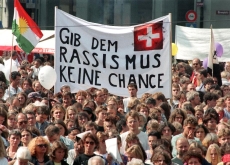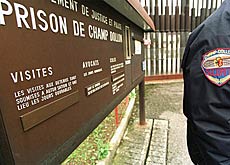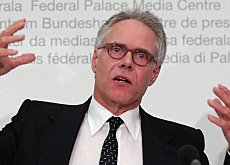Ministry re-examines genocide definition

A senior justice ministry official says the current anti-racism law needs to be re-examined to modify a clause on genocide.
The head of the Federal Justice Office, Michael Leupold, argues that a judge is not in a position to decide on the definition of genocide.
The debate on Switzerland’s anti-racism legislation came to the fore after Justice Minister Christoph Blocher, a member of the rightwing Swiss People’s Party, announced during a visit to Turkey in October that he wanted to change the law.
Any act of denying, belittling or justifying genocide is a violation of Swiss anti-racism legislation.
The law prompted investigations against two Turkish citizens, including a historian, for allegedly denying the 1915 Armenian massacre.
In an interview with the SonntagsZeitung newspaper, Leupold said there could be no question of abolishing the anti-racism law but certain changes were necessary.
For Leupold it is up to historians and not judges to decide on the definition of genocide. He added that it was not clear whether the current law infringes on the freedom of speech.
However, Boël Sambuc, vice-president of the Federal Commission on Racism she was shocked by Leupold’s comments.
“The law is very clear and Switzerland also signed an international convention aimed at preventing genocide,” she told public radio.
One expert group
Leupold added that judges should seek assistance from an international institution or that the relevant clause be struck from the law altogether.
His comments echo a statement by Justice Minister Blocher who said the anti-racism law needed to be clearer and less ambiguous.
A working group re-examining the legislation is made of one person so far, according to Leupold.
He added the he had not been asked to exclude the president of the Federal Commission against Racism from the group.
The controversial head of the government-advisory committee has publicly accused Blocher of telling lies.

More
Federal Commission against Racism
Geneva prison
In a separate issue, Leupold announced that the justice ministry was ready to consider a financial contribution to upgrade the overcrowded prison of Champ-Dollon outside Geneva.
He said the federal authorities were willing to pay just over a third of the planned costs estimated at SFr68 million ($54.8 million) which the Geneva cantonal parliament is due to consider next year.
Champ-Dollon is notorious for being Switzerland’s most overcrowded jail. It contains more than 500 inmates, but its normal capacity is set at 270.
A series of hunger strikes over alleged police brutality and slow justice, suicides, and a fire in the prison have caught media attention over the past few months.
In April human rights campaigners described the situation in the prison as potentially explosive.
swissinfo with agencies
Swiss anti-racism legislation was adopted in 1994, among other things to prevent revisionist views about the Holocaust.
In 2005, Swiss authorities launched criminal investigations against the historian Yusuf Halacoglu, the president of the Turkish History Organisation, and the politician Dogu Perinçek for allegedly making comments in Switzerland denying the 1915 Armenian massacre.
Armenians say around 1.8 million of their people were killed. Turkey disputes this, putting the figure closer to 200,000.
Under Swiss law any act of denying, belittling or justifying genocide is a violation of the country’s anti-racism legislation

In compliance with the JTI standards
More: SWI swissinfo.ch certified by the Journalism Trust Initiative











You can find an overview of ongoing debates with our journalists here . Please join us!
If you want to start a conversation about a topic raised in this article or want to report factual errors, email us at english@swissinfo.ch.